Author Archive
Sunday, June 6th, 2010
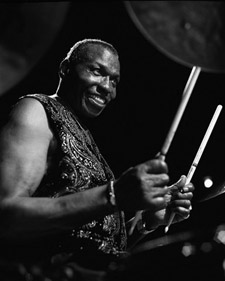 Photographed: Elvin Jones Elvin Jones
Elvin “The Emperor” Jones was best known for his association with the classic John Coltrane Quartet (1960-1965) but he also had a notable career as a bandleader and continued to be a major influence in music. One of the all-time great drummers (bridging the gap between advanced hard bop and the avant-garde), Jones is the younger brother of a remarkable musical family that also includes Hank and Thad Jones. After spending time in the Army (1946-1949), he was a part of the very fertile Detroit jazz scene of the early ’50s.
He moved to New York in 1955, worked with Teddy Charles and the Bud Powell Trio, and recorded with Miles Davis and Sonny Rollins (the latter at his famous Village Vanguard session). After stints with J.J. Johnson (1956-1957), Donald Byrd (1958), and Harry “Sweets” Edison, Jones became an important member of John Coltrane’s Quartet, pushing the innovative saxophonist to remarkable heights and appearing on most of his best recordings. When Coltrane added Rashied Ali to his band in late 1965 as second drummer, Jones was reportedly not pleased and soon departed.
He went on a European tour with the Duke Ellington Orchestra and then started leading his own groups, which in the ’90s became known as Elvin Jones’ Jazz Machine. He remained active well into the 2000s and continued to push himself musically with the Jazz Machine, inviting young lions into the fold and touring regularly. Jones recorded as a leader for many labels including Atlantic, Riverside, Impulse, Blue Note, Enja, PM, Vanguard, Honey Dew, Denon, Storyville, Evidence, and Landmark.
His dedication to and love of the drums were such that even in the face of health problems he continued to mount the drum stand, occasionally accompanied by an oxygen tank. On May 18, 2004, drum legend Elvin Jones suffered heart failure and passed away.
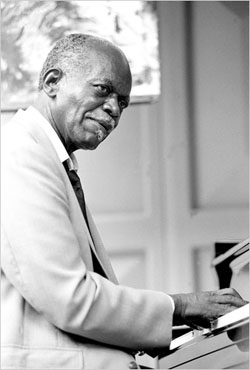 Photographed: Hank Jones Hank Jones
The oldest of the three illustrious Jones brothers (along with Thad and Elvin), Hank Jones was also the first of the great Detroit pianists (including Tommy Flanagan, Barry Harris, and Roland Hanna) to emerge after World War II, although by then he had long since left town. Jones played in territory bands as a teenager, and in 1944, he moved to New York to play with Hot Lips Page.
Influenced by Teddy Wilson and Art Tatum, Jones’ style was also open to bebop, and his accessible playing was flexible enough to fit into many genres. He was on several Jazz at the Philharmonic tours (starting in 1947), worked as accompanist for Ella Fitzgerald (1948-1953), and recorded with Charlie Parker. In the ’50s, Jones performed with Artie Shaw, Benny Goodman, Lester Young, Cannonball Adderley, and many others.
He was on the staff of CBS during 1959-1976 but always remained active in jazz. In the late ’70s, Jones was the pianist in the Broadway musical Ain’t Misbehavin’ and he recorded with a pickup unit dubbed the Great Jazz Trio which, at various times, included Ron Carter, Buster Williams, or Eddie Gomez on bass, and Tony Williams, Al Foster, or Jimmy Cobb on drums.
As a leader, Hank Jones recorded for many labels, including Verve, Savoy, Epic, Golden Crest, Capitol, Argo, ABC-Paramount, Impulse!, Concord, East Wind, Muse, Galaxy, Black & Blue, MPS, Inner City, and Chiaroscuro.
Hank Jones died in New York City on May 16, 2010, at the age of 91.
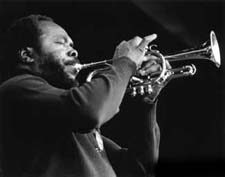 Photographed: Thad Jones Thad Jones
A harmonically advanced trumpeter/cornetist with a distinctive sound, as well as a talented arranger/composer, Thad Jones (the younger brother of Hank and older brother of Elvin) had a very productive career. Self-taught on trumpet, he started playing professionally with Hank Jones and Sonny Stitt when he was 16.
After serving in the military (1943-1946), Jones worked in territory bands in the Midwest. During 1950-1953 he performed regularly with Billy Mitchell’s quintet in Detroit and he made a few recordings with Charles Mingus (1954-1955). Jones became well-known during his long period (1954-1963) with Count Basie’s Orchestra, taking a “Pop Goes the Weasel” chorus on “April in Paris,” and sharing solo duties with Joe Newman. While with Basie, Jones had the opportunity to write some arrangements and he became a busy freelance writer after 1963.
He joined the staff of CBS, co-led a quintet with Pepper Adams, and near the end of 1965, organized a big band with drummer Mel Lewis that from February 1966 on, played Monday nights at the Village Vanguard. During the next decade the orchestra became famous and gave Jones an outlet for his writing. He composed one standard (“A Child Is Born”) along with many fine pieces including “Fingers,” “Little Pixie,” and “Tiptoe.”
Among the sidemen in the Thad Jones-Mel Lewis Orchestra (which started out as an all-star group and later on featured younger players) were trumpeters Bill Berry, Danny Stiles, Richard Williams, Marvin Stamm, Snooky Young, and Jon Faddis, trombonists Bob Brookmeyer, Jimmy Knepper, and Quentin Jackson, the reeds of Jerome Richardson, Jerry Dodgion, Eddie Daniels, Joe Farrell, Pepper Adams, and Billy Harper, pianists Hank Jones and Roland Hanna, and bassists Richard Davis and George Mraz.
In 1978, Jones surprised Lewis by suddenly leaving the band and moving to Denmark, an action he never explained. He wrote for a radio orchestra and led his own group called Eclipse. In late 1984 Jones took over the leadership of the Count Basie Orchestra but within a year bad health forced him to retire.
Thad Jones recorded as a leader for Debut (1954-1955), Blue Note, Period, United Artists, Roulette, Milestone, Solid State, Artists House, A&M, Metronome, and many of the Thad Jones-Mel Lewis Orchestra’s best recordings have been reissued.
Biographies by Scott Yanow
Posted in Artist of the Month | 3 Comments »
Sunday, June 6th, 2010
 Inspiring youth Inspiring youth
Kinston native Ira Wiggins, who now-heads the Jazz Studies program at North Carolina Central University, remembers playing in his brother’s R&B group in the ’70s and making a good living from the various clubs in the area.
“We played in Rocky Mount, Wilson, all the small towns, as well as Kinston, Goldsboro, Washington,” he says. “There was a lot of work for live musicians at the time. I think that’s one of the reasons we were inspired by a lot of the older
musicians that were passing the music along to the younger generation, and these people really play.”
But a series of events and cultural changes, including the demise of the tobacco industry and even the advent of disco, helped decimate what was once a thriving musical circuit for African-American musicians in the area. Wiggins remembers seeing gigs dry up as club owners decided to hire DJs, who came cheaper than a full band.
“We were a pretty good group at the time,” says Wiggins. “We would play the same thing thing the DJ played, and everybody would sit there. As the DJ played the same tune, everybody would get up and dance. It was a kind of dichotomy: The older generation didn’t want to go out and hear records, and the younger generation didn’t
want to go out and hear live music, so eventually I think a lot of the clubs died out because of lack of support.”
These days, the rich African American musical history is a little more hidden. One of the goals among the trail’s organizers is to reach young people, many of whom have no clue about the rich musical heritage of their own hometowns.
Parker, in particular, remembers working with a group of students in Kinston. Afterward, one of the organizers told him something he simply couldn’t believe.
“He said, ‘Maceo, you’re not going to believe this. One little black kid came up and said, ‘I never knew black people played saxophone.’ And he was sincere.”
“We want it also to inspire youth,” says Myers, of The Monitors. “People still want to come up to us and touch the horn, hit the drum, and stuff like that. I did that as a child rnyself. And that’s inspirational. ‘If he can do it… then maybe I can do that” ”
Inspiration and motivation are abundant at the Community Council for the Arts in Kinston. In a renovated historic grocery store across the street from boarded-up buildings and lots still empty after being devastated by Hurricane Floyd, the arts council plays host to a youth jazz group on Wednesdays, affording middle and high school students of all races the opportunities to leam and play.
In one recent youth group session, long;tirne Kinston High School band teacher Charles Richberg, seated in front of the students with an electric bass in his hands, calls out, “Who wans to do a solo?” One boywith a trumpet speaks up.The others are shy.
“Come on,” says Richberg. “This is what jazz is about!”
His passion shines.
“There’s so much pulling our young people away from music itself and telling them you have to be ready for the 21st century,” says Richberg, who taught Maceo Parker’s children and often jams with musicians in the area. “But nevertheless musicians are still going to be here, no matter how advanced in technology we become. We’re still going to need musicians.
“Will it ever come back? I’d love to see it come back, but that’s going to be a long-traveled road and old diehards like me, Ira, Maceo, we still keep diggog at it to make it happen. I don’t think it would reach the mass of people like it did then, but it will be a part of this community.”
Karen A. Mann is a freelance writer based in Raleigh. She wites about area music on her blog, “Mann’s World.”
Posted in Music News | 7 Comments »
Monday, May 24th, 2010
Music Interviews
100 Years Of Jazz Clarinetist Artie Shaw
In the 1930s and ’40s, Artie Shaw’s band ranked with the Benny Goodman, Jimmy Dorsey and Glenn Miller bands in popularity. But he largely rejected pop tunes and stuck with music by composers such as George Gershwin and Irving Berlin. Fresh Air remembers one of jazz’s greatest clarinetists and big-band leaders with excerpts from a 1985 interview.
Take Five: A Jazz Sampler
Get To Know Clarinetist Artie Shaw
Shaw displayed an impossibly round, mellow tone from the top to the bottom of the clarinet. He employed loop-de-loop breaks that were hard to finger, and equally hard to figure out. Explore Shaw’s swinging musical persona of the late 1930s in five songs.
Studio Sessions
Regina Carter: Translating African Folk To The Jazz Violin
Carter’s new album marks a new direction for the jazz violinist: The record interprets African folk songs, both traditional and contemporary. Carter and members of her band recently visited NPR to explain and perform songs from Reverse Thread.
Music News
Legendary Jazz Pianist Hank Jones Dies At 91
Hank Jones was the last of a musical dynasty, as well as a linchpin in the history of jazz. Jones played with everyone from Benny Goodman and Artie Shaw to Charlie Parker and Marilyn Monroe. Jones died Sunday night after a brief illness. He was 91.
A Blog Supreme
The Late Pianist Hank Jones On NPR
A musician whose career spanned the majority of jazz history and whose playing reflected the lion’s share of it, died Sunday, May 16. He was 91. Hear recent interviews, performances and features with the elegant pianist.
Posted in Music News | 12 Comments »
Thursday, May 20th, 2010
 A resolution (H.Res.1361) recognizing the Centennial of North Carolina Central University will be considered on the floor of the U.S. House of Representatives today. Representatives, including resolution sponsor Rep. David Price (D-N.C.), will speak in support of the resolution. Click here to read the resolution. A resolution (H.Res.1361) recognizing the Centennial of North Carolina Central University will be considered on the floor of the U.S. House of Representatives today. Representatives, including resolution sponsor Rep. David Price (D-N.C.), will speak in support of the resolution. Click here to read the resolution.
Co-sponsors of the resolution include: Rep. G.K. Butterfield (D- N.C.), Rep. Cathy Castor (D- Fla.), Rep. William Lacy Clay (D- Mo.), Rep. Howard Coble (R- N.C.), Rep. Gerry Connolly (D-Va.), Rep. Yvette Clarke (D-N.Y.), Rep. Artur Davis (D-Ala.), Rep. Danny Davis (D- Ill.), Rep. Bob Etheridge (D-N.C.), Rep. Chaka Fattah (D-Pa.), Rep. Virginia Foxx (R-N.C.), Rep. Marcia Fudge (D-Ohio), Rep. Hank Johnson (D- Ga.), Rep. Walter Jones (R-N.C.), Rep. Larry Kissell (D-N.C.), Rep. Barbara Lee (D-Calif.), Rep. Patrick McHenry (R-N.C.), Rep. Mike McIntyre (D-N.C.), Rep. Kendrick Meek (D-Fla.), Rep. Gregory Meeks (D-N.Y.), Rep. Brad Miller (D-N.C.), Rep. Sue Myrick (R-N.C.), Rep. Bobby Rush (D-Ill.), Rep. Bobby Scott (D-Va.), Rep. Heath Shuler (D-N.C.), Rep. Vic Snyder (D-Ark.), Rep. Edolphus Towns (D-N.Y.) and Rep. Mel Watt (D-N.C.).
Posted in Public Affairs | 11 Comments »
Monday, May 17th, 2010
 Hank Jones, whose self-effacing nature belied his stature as one of the most respected jazz pianists of the postwar era, died on Sunday in the Bronx. He was 91. Hank Jones, whose self-effacing nature belied his stature as one of the most respected jazz pianists of the postwar era, died on Sunday in the Bronx. He was 91.
His death, at Calvary Hospital Hospice, was announced by his longtime manager, Jean-Pierre Leduc. Mr. Jones lived on the Upper West Side of Manhattan and also had a home in Hartwick, N.Y.
Mr. Jones spent much of his career in the background. For three and a half decades he was primarily a sideman, most notably with Ella Fitzgerald; for much of that time he also worked as a studio musician on radio and television.
His fellow musicians admired his imagination, his versatility and his distinctive style, which blended the urbanity and rhythmic drive of the Harlem stride pianists, the dexterity of Art Tatum and the harmonic daring of bebop. (The pianist, composer and conductor André Previn once called Mr. Jones his favorite pianist, “regardless of idiom.”)
But unlike his younger brothers Thad, who played trumpet with Count Basie and was later a co-leader of a celebrated big band, and Elvin, an influential drummer who formed a successful combo after six years with John Coltrane’s innovative quartet, Hank Jones seemed content for many years to keep a low profile.
That started changing around the time he turned 60. Riding a wave of renewed interest in jazz piano that also transformed his close friend and occasional duet partner Tommy Flanagan from a perpetual sideman to a popular nightclub headliner, Mr. Jones began working and recording regularly under his own name, both unaccompanied and as the leader of a trio. Listeners and critics took notice.
Reviewing a nightclub appearance in 1989, Peter Watrous of The New York Times praised Mr. Jones as “an extraordinary musician” whose playing “resonates with jazz history” and who “embodies the idea of grace under pressure, where assurance and relaxation mask nearly impossible improvisations.”
Mr. Jones further enhanced his reputation in the 1990s with a striking series of recordings that placed his piano in a range of contexts — including an album with a string quartet, a collaboration with a group of West African musicians and a duet recital with the bassist Charlie Haden devoted to spirituals and hymns. In 1998, he appeared at Lincoln Center with a 32-piece orchestra in a concert consisting mostly of his own compositions.
Henry W. Jones Jr. was born in Vicksburg, Miss., on July 31, 1918. He grew up one of 10 children in Pontiac, Mich., near Detroit, where he started studying piano at an early age and first performed professionally at 13. He began playing jazz even though his father, a Baptist deacon, disapproved of the genre.
Mr. Jones worked with regional bands, mostly in Michigan and Ohio, before moving to New York in 1944 to join the trumpeter and singer Hot Lips Page’s group at the Onyx Club on 52nd Street.
He was soon in great demand, working for well-known performers like the saxophonist Coleman Hawkins and the singer Billy Eckstine.
“People heard me and said, ‘Well, this is not just a boy from the country — maybe he knows a few chords,’ ” he told Ben Waltzer in a 2001 interview for The Times. He abandoned the freelance life in late 1947 to become Ella Fitzgerald’s accompanist and held that job until 1953, occasionally taking time out to record with Charlie Parker and others.
He kept busy after leaving Fitzgerald. Among many other activities, he began an association with Benny Goodman that would last into the 1970s, and he was a member of the last group Goodman’s swing-era rival Artie Shaw led before retiring in 1954. But financial security beckoned, and in 1959 he became a staff musician at CBS. He also participated in a celebrated moment in presidential history when he accompanied Marilyn Monroe as she sang “Happy Birthday” to President John F. Kennedy, who was about to turn 45, during a Democratic Party fund-raiser at Madison Square Garden in May 1962.
Mr. Jones remained intermittently involved in jazz during his long tenure at CBS, which ended when the network disbanded its music department in the mid-’70s. He was a charter member of the big band formed by his brother Thad and the drummer Mel Lewis in 1966, and he recorded a few albums as a leader. More often, however, he was heard but not seen on “The Ed Sullivan Show” and other television and radio programs.
“Most of the time during those 15 or so years, I wasn’t playing the kind of music I’d prefer to play,” Mr. Jones told Howard Mandel of Down Beat magazine in 1994. “It may have slowed me down a bit. I would have been a lot further down the road to where I want to be musically had I not worked at CBS.” But, he explained, the work gave him “an economic base for trying to build something.”
Once free of his CBS obligations, Mr. Jones began quietly making a place for himself in the jazz limelight. He teamed with the bassist Ron Carter and the drummer Tony Williams, alumni of the Miles Davis Quintet, to form the Great Jazz Trio in 1976. (The uncharacteristically immodest name of the group, which changed bassists and drummers frequently over the years, was not Mr. Jones’s idea.)
Two years later he began a long run as the musical director and onstage pianist for “Ain’t Misbehavin’,” the Broadway revue built around the music of Fats Waller, while also playing late-night solo sets at the Cafe Ziegfeld in Midtown Manhattan.
By the early 1980s, Mr. Jones’s late-blooming career as a band leader was in full swing. Since then he worked frequently in the United States, Europe and Japan. While he had always recorded prolifically — by one estimate he can be heard on more than a thousand albums — for the first time he concentrated on recording under his own name, which he continued to do well into the 21st century.
He is survived by his wife, Theodosia.
Mr. Jones was named a National Endowment for the Arts jazz master in 1989. He received the National Medal of Arts in 2008 and a lifetime achievement Grammy Award in 2009. And he continued working almost to the end. Laurel Gross, a close friend, said he had toured Japan in February and had scheduled a European tour in the spring until doctors advised against it. He was also scheduled to perform at Birdland in Manhattan this summer to celebrate his birthday.
Reaching for superlatives, critics often wrote that Mr. Jones had an exceptional touch. He himself was not so sure.
“I never tried consciously to develop a ‘touch,’ ” he told The Detroit Free Press in 1997. “What I tried to do was make whatever lines I played flow evenly and fully and as smoothly as possible.
“I think the way you practice has a lot to do with it,” he explained. “If you practice scales religiously and practice each note firmly with equal strength, certainly you’ll develop a certain smoothness. I used to practice a lot. I still do when I’m at home.” Mr. Jones was 78 years old at the time.
Posted in Music News | 18 Comments »
Thursday, May 6th, 2010
Six people with ties to North Carolina Central University will be recipients of a newly created honor, called the Shepard Medallion, as part of the university’s 100th anniversary.
The six are:
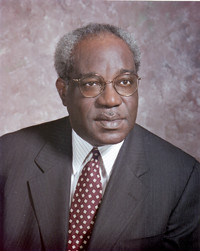 Julius Chambers, an NCCU alumnus, legal champion for civil rights and Chancellor Emeritus; H.M. “Mickey” Michaux Jr., an NCCU alumnus whose long career as a member of the state House of Representatives has focused on the fight for higher education, particularly for minority students; Mattie Sharpless, an NCCU alumna, former U.S. ambassador and longtime foreign agricultural envoy; LeRoy Walker, chancellor emeritus and past NCCU and Olympic track coach, and the first black president of the U.S. Olympic Committee; Peggy Ward, an alumna, former NCCU trustee and award-winning agent for a national life insurance company, and NCCU Chancellor emeritus Albert N. Whiting. Julius Chambers, an NCCU alumnus, legal champion for civil rights and Chancellor Emeritus; H.M. “Mickey” Michaux Jr., an NCCU alumnus whose long career as a member of the state House of Representatives has focused on the fight for higher education, particularly for minority students; Mattie Sharpless, an NCCU alumna, former U.S. ambassador and longtime foreign agricultural envoy; LeRoy Walker, chancellor emeritus and past NCCU and Olympic track coach, and the first black president of the U.S. Olympic Committee; Peggy Ward, an alumna, former NCCU trustee and award-winning agent for a national life insurance company, and NCCU Chancellor emeritus Albert N. Whiting.
Five of the six are scheduled to receive the specially designed bronze medallions at the university’s Centennial Gala on May 22 at the Durham Performing Arts Center. Whiting’s travel plans from his home in Maryland were uncertain on Tuesday. Nominees for the Shepard Medallion were solicited from the campus and nationally. From that pool, a campus committee recommended a handful of finalists to NCCU Chancellor Charlie Nelms, who picked the honorees.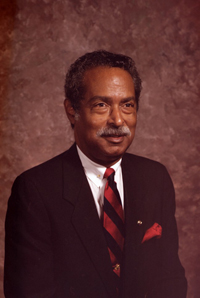
Nelms commissioned the medal to recognize people, associated with the university, who have made significant contributions to the school, to their communities or to their professions. The contributions must be in keeping with the public university’s motto, “Truth and Service.”
“Our rather small university has produced more than its share of leaders, in every sphere of endeavor,” Nelms said in announcing the awardees. “We’ve sent legislators to Washington and Raleigh, and scientists to the most prestigious laboratories in the nation. Our faculty and students served in the trenches of the civil rights movement. Hundreds, maybe thousands, of NCCU-trained teachers have educated our school children and college students. These people we honor rise to the top of anyone’s list of exemplars of service and achievement.”
Chambers was NCCU’s chancellor from 1993 to 2001. A 1958 graduate of the school and a president of the student body, he went on to obtain a law degree and fought key civil rights court cases. 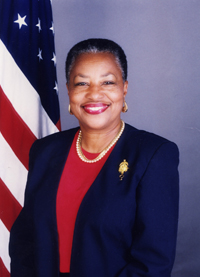 His Charlotte law firm, the first integrated firm in the state, is credited with influencing more landmark state and federal legislation in school desegregation, employment and voting rights than any other in the United States. His Charlotte law firm, the first integrated firm in the state, is credited with influencing more landmark state and federal legislation in school desegregation, employment and voting rights than any other in the United States.
Michaux received his undergraduate and law degrees from NCCU, in 1952 and 1964, respectively. He became the first African-American U.S. Attorney for the Eastern District of North Carolina, and first won a seat in the state House of Representatives in 1972. He is considered the dean of the General Assembly, and in recent years, has guided the annual state budget through the chamber. He has tirelessly campaigned for adequate funding for NCCU and other minority universities.
Sharpless received a bachelor’s in business education in 1965 and a master’s in business administration and economics in 1972 from NCCU. She joined the U.S. Foreign Agricultural Service in 1965 and was its acting administrator for much of 2001. Following that position, 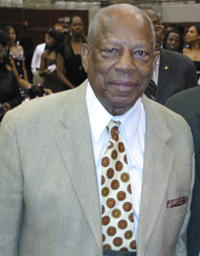 Sharpless was named U.S. Ambassador to the Central African Republic, where she served until a coup toppled that nation’s government in 2003. With that posting, however, Sharpless became the first woman agricultural attaché to serve as an ambassador. She retired in 2006. Sharpless was named U.S. Ambassador to the Central African Republic, where she served until a coup toppled that nation’s government in 2003. With that posting, however, Sharpless became the first woman agricultural attaché to serve as an ambassador. She retired in 2006.
Walker was chancellor from 1983 to 1986, but he was a familiar figure on the NCCU campus. Walker became head track and field coach at NCCU in 1945. He went on to chair the physical education and recreation departments. His track teams at NCCU were legendary, and many of the members competed in the Olympics across the span of decades. He was president of the U.S. Olympic Committee and in 1987 was inducted into the U.S. Olympic Hall of Fame.
Ward is a 1974 alumna of NCCU. She is a longtime agent for New York Life Insurance Co., where she has won numerous awards for her service to the company and to her clients. Ward served on the university’s Board of Trustees from 1993 until 1997, and was chairman of the board from 1995 until 1997. She also served on the board of trustees of UNC-TV, part of the University of North Carolina system, and chair of that board’s Advancement Committee.
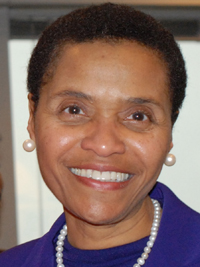 Whiting was NCCU’s last president and first chancellor. Named president of North Carolina College in 1967, Whiting was chief executive when the university was made part of the UNC system in 1972 and the name of his position changed to chancellor. Under Whiting, NCCU’s School of Business was created and programs in public administration and criminal justice were launched. Whiting was NCCU’s last president and first chancellor. Named president of North Carolina College in 1967, Whiting was chief executive when the university was made part of the UNC system in 1972 and the name of his position changed to chancellor. Under Whiting, NCCU’s School of Business was created and programs in public administration and criminal justice were launched.
The medallion features a likeness of Shepard’s statue in front of NCCU’s administration building and the date of the school’s opening. On its reverse, the phrase “The Shepard Medallion” is written in raised letters. The recipients’ names will be engraved on each.
The May 22 gala is one of the more formal events in NCCU’s yearlong centennial celebration. Dr. James E. Shepard, a pharmacist and academic and business leader, chartered his school in 1909. Then called the National Religious Training School and Chautauqua, the school formally opened its doors to students on July 5, 1910.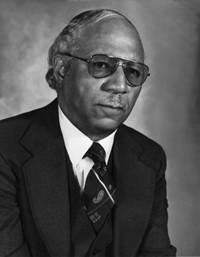
Tickets to the gala are $100, and can be purchased online at www.nccu.edu/gala.
The medallion was struck by Recognition Products International, a Maryland company that manufactures the Pulitzer Prize medal as well as the University Award medallion, presented annually by the board of governors of the 17-campus University of North Carolina system for illustrious service to higher education.
Sponsors of the Gala include State Farm Insurance Co., The Forest At Duke and The Freelon Group.
Posted in Public Affairs | 3 Comments »
Monday, May 3rd, 2010
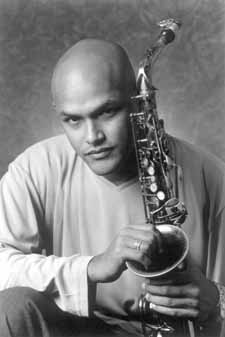 Miguel Zenón was born and raised in San Juan, Puerto Rico. There, he studied classical saxophone at the famed Escuela Libre de Musica. Although Zenón was exposed to jazz while in high school, it wasn’t until he began his studies at the Berklee School of Music that his formal jazz training began. After graduating from Berklee, Zenón received a scholarship to attend Manhattan School of Music and in 2001, he received a Masters in Saxophone Performance. The distinguished list of educators he has studied with include Angel Marrero, Leslie Lopez, Rafael Martinez, Danilo Perez, Dick Oatts, Dave Liebman, George Garzone and Bill Pierce. Miguel Zenón was born and raised in San Juan, Puerto Rico. There, he studied classical saxophone at the famed Escuela Libre de Musica. Although Zenón was exposed to jazz while in high school, it wasn’t until he began his studies at the Berklee School of Music that his formal jazz training began. After graduating from Berklee, Zenón received a scholarship to attend Manhattan School of Music and in 2001, he received a Masters in Saxophone Performance. The distinguished list of educators he has studied with include Angel Marrero, Leslie Lopez, Rafael Martinez, Danilo Perez, Dick Oatts, Dave Liebman, George Garzone and Bill Pierce.
In his relatively short, but rather illustrious career, Zenón has performed and/or recorded with a quite a diverse array of artists including David Sanchez, Charlie Haden, The Village Vanguard Orchestra, Bobby Hutcherson, Bob Moses and Mozamba, The Either Orchestra, Guillermo Klein y Los Guachos, The Mingus Big Band, Jerry Gonzalez & The Fort Apache Band, Ray Barretto, and Steve Coleman, among others.
The saxophonist and composer has released four recordings as a leader. His debut CD Looking Forward, was selected by The New York Times as the number one independent jazz record of 2002. In 2004, after being one of the first artists signed to Marsalis Music, he released the critically acclaimed Ceremonial. This same year also marked the beginning of three consecutive years on the top of the Downbeat Critic’s Poll in the Rising Star Alto Sax category. Zenón topped that category as well in 2008,making that the fourth time in the last five 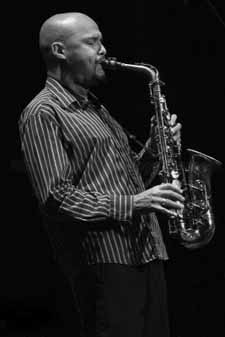 years. years.
In 2005, Zenón was honored by Billboard magazine as one of the “Faces to Watch– 30 Under 30: Top Young Acts and Executives.” That year Zenón also released Jibaro, a tribute to the “Musica Jibara” of Puerto Rico and commissioned by a grant from the New York State Council of the Arts. Like his previous recordings, Jibaro was uniformly well received and appeared on many top ten lists including The New York Times, Latin Beat, El Nuevo Dia, and The Chicago Tribune. In 2006, the readers of Jazz Times magazine voted him the Best New Artist of the Year. Awake, his fourth recording as a leader was released in April 2008. It was chosen as one of the Best Jazz Cd’s of 2008 by Jazz.com, Jazz Improv magazine, Cuadernos de Jazz, JazzTimes and El Nuevo Dia, among others.
Esta Plena, his latest release as a leader, creates a bridge between elements of “Jazz Music” and “Plena Music” from Puerto Rico. It was unanimously heralded as one of the bestjazz releases of 2009 by publications such as The Village Voice, The Chicago Tribune, The Philadelphia Enquire and Jazz Times, among others. It also received two Grammy Nominations, for “Best Latin Jazz Album” and “Best Improvised Jazz Solo”.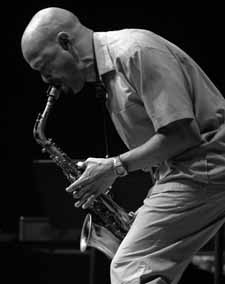
In 2003, as part of the Kennedy Center’s Jazz Ambassador’s Program, Zenón’s quartet was selected to teach and perform throughout West Africa. Since then he has done master classes, clinics and/or residencies in such diverse institutions as the Banff Centre, University of Manitoba, LeMoyne College, UMASS-Amherst, the Brubeck Institute, Berklee College of Music, Conservatoire de Paris, Rotterdam Conservatory, Manhattan School of Music, Amsterdam Conservatory and the Diaz Institute. Zenón also serves as a private saxophone instructor at The New School for Jazz and Contemporary Music in New York. Starting in the Fall of 2009, Zenón will be joining the jazz faculty at the New England Corservatory in Boston, MA.
In April 2008, Zenón received a fellowship from the prestigious John Simon Guggenheim Foundation to work on his next project, which focused on Plena Music from Puerto Rico. Later that year he was one of 25 distinguished individuals chosen to receive the coveted MacArthur Grant, also know as the “Genius Grant”.
Posted in Artist of the Month | 3 Comments »
Monday, April 26th, 2010
 The NCCU Board of Trustees is scheduled to meet on Tuesday in the Chancellor’s Dining Room of the Pearson Cafeteria and Wednesday in the Emma Marable Conference Room of the William Jones Building, Room 110. The agenda is attached and below. The NCCU Board of Trustees is scheduled to meet on Tuesday in the Chancellor’s Dining Room of the Pearson Cafeteria and Wednesday in the Emma Marable Conference Room of the William Jones Building, Room 110. The agenda is attached and below.
Tuesday, April 27, 2010
8:30 a.m. – 9:00 a.m. Continental Breakfast
Chancellor’s Dining Room, Pearson Cafeteria
9:00 a.m. – 10:00 a.m. Policy Discussion
North Carolina Central University Strategic Plans
Chancellor Nelms and Johnnie Southerland
COMMITTEE MEETINGS
10:00 a.m. – 10:30 a.m. Finance Committee
Perry*, Ruffin, Adams, Pope, Wysenski
Chancellor’s Dining Room, Pearson Cafeteria
10:30 a.m. – 11:00 a.m. Board of Trustees of the Endowment Fund
Adams*, Epps, Baron, Dolan, Hamilton, Johnson, Thornton, Nelms
Chancellor’s Dining Room, Pearson Cafeteria
11:00 a.m. – 12:00 p.m. Personnel Committee
Hamilton*, Baron, Adams, Dolan, Epps, Thomas
Chancellor’s Dining Room, Pearson Cafeteria
12:00 p.m. – 1:30 p.m. LUNCH (Trustees and Vice Chancellors only)
Culinary Laboratory, Pearson Cafeteria
1:30 p.m. – 2:00 p.m. Audit Committee
Michaux*, Wysenski, Epps, Hamilton, Pope
Chancellor’s Dining Room, Pearson Cafeteria
2:00 p.m. – 3:00 p.m. Educational Planning and Academic Affairs Committee
Dolan*, Pope, Johnson, Perry, Thornton, Thomas
Chancellor’s Dining Room, Pearson Cafeteria
3:00 p.m. – 3:30 p.m. Institutional Advancement
Ruffin*, Hamilton, Epps, Michaux, Thornton, Wysenski
Chancellor’s Dining Room, Pearson Cafeteria
3:30 p.m. – 4:00 p.m. Building Committee
Baron*, Dolan, Michaux, Perry, Pope, Ruffin
Chancellor’s Dining Room, Pearson Cafeteria
4:15 p.m. – 5:00 p.m. Trustee-Student Relations Committee
Thomas*, Johnson, Michaux, Ruffin, Thornton, Wysenski
Chancellor’s Dining Room, Pearson Cafeteria
Wednesday, April 28, 2010
9:00 a.m. Board of Trustees Meeting
Emma Marable Conference Room
Room 110, William Jones Building
11:30 a.m. LUNCH
Emma Marable Conference Room
Room 110, William Jones Building
MEETING TIMES SUBJECT TO CHANGE
Posted in Public Affairs | 6 Comments »
Saturday, April 24th, 2010
North Carolina Central University is pleased to announce the return of Inside NCCU to WNCU 90.7 FM after a six-month hiatus. The program will air on Saturday mornings at 9 a.m. starting May 1. With special guests from the NCCU community, it will offer lively conversations with real people, and will entertain and inform listeners on the happenings of this bustling campus.
“We’re committed to keeping the public apprised of the news and events at Durham’s only public university,” said Cynthia Fobert, NCCU director of public relations. “Many of our lectures, exhibits, and concerts are free and open to the community and we want to make sure our listeners know they’re welcome on our campus.”
“We are delighted that the show can air again during the 100th anniversary of the institution,” said WNCU general manager Lackisha Sykes Freeman. “We hope this show will spotlight the good work that NCCU does.”
The show will feature the voice of new Eagle Myra Wooten as host. She is a public communications specialist in the Office of Public Relations. “There are great things happening at NCCU, and this program gives us the platform to showcase that,” Wooten said. “I am thrilled that I get to bring this information to our community.”
Inside NCCU is a weekly 30-minute program. Listeners can also hear it online at www.wncu.org. To contribute show ideas or to be a guest on the program, contact the Office of Public Relations at 530-7219 or publicrelations@nccu.edu.
Posted in Public Affairs | 6 Comments »
Wednesday, April 21st, 2010
As part of an ongoing initiative to serve our listeners in the public interest, WNCU 90.7 FM invites you to listen to and participate in a community-based program to meet with candidates running to fill seats on the Durham County School Board.
WNCU 90.7 FM will air a live town hall meeting in the auditorium of the H. M. Mickey Michaux School of Education on the campus of North Carolina Central University on Saturday May 1, 2010 from 9:30 a.m. until 11:00 a.m. This event is free and open to the public. Meeting attendees will have an opportunity to ask questions of the candidates during the meeting. The program will also stream live.
Posted in Public Affairs | 4 Comments »
|





 Inspiring youth
Inspiring youth Julius Chambers, an NCCU alumnus, legal champion for civil rights and Chancellor Emeritus; H.M. “Mickey” Michaux Jr., an NCCU alumnus whose long career as a member of the state House of Representatives has focused on the fight for higher education, particularly for minority students; Mattie Sharpless, an NCCU alumna, former U.S. ambassador and longtime foreign agricultural envoy; LeRoy Walker, chancellor emeritus and past NCCU and Olympic track coach, and the first black president of the U.S. Olympic Committee; Peggy Ward, an alumna, former NCCU trustee and award-winning agent for a national life insurance company, and NCCU Chancellor emeritus Albert N. Whiting.
Julius Chambers, an NCCU alumnus, legal champion for civil rights and Chancellor Emeritus; H.M. “Mickey” Michaux Jr., an NCCU alumnus whose long career as a member of the state House of Representatives has focused on the fight for higher education, particularly for minority students; Mattie Sharpless, an NCCU alumna, former U.S. ambassador and longtime foreign agricultural envoy; LeRoy Walker, chancellor emeritus and past NCCU and Olympic track coach, and the first black president of the U.S. Olympic Committee; Peggy Ward, an alumna, former NCCU trustee and award-winning agent for a national life insurance company, and NCCU Chancellor emeritus Albert N. Whiting.
 His Charlotte law firm, the first integrated firm in the state, is credited with influencing more landmark state and federal legislation in school desegregation, employment and voting rights than any other in the United States.
His Charlotte law firm, the first integrated firm in the state, is credited with influencing more landmark state and federal legislation in school desegregation, employment and voting rights than any other in the United States. Sharpless was named U.S. Ambassador to the Central African Republic, where she served until a coup toppled that nation’s government in 2003. With that posting, however, Sharpless became the first woman agricultural attaché to serve as an ambassador. She retired in 2006.
Sharpless was named U.S. Ambassador to the Central African Republic, where she served until a coup toppled that nation’s government in 2003. With that posting, however, Sharpless became the first woman agricultural attaché to serve as an ambassador. She retired in 2006. Whiting was NCCU’s last president and first chancellor. Named president of North Carolina College in 1967, Whiting was chief executive when the university was made part of the UNC system in 1972 and the name of his position changed to chancellor. Under Whiting, NCCU’s School of Business was created and programs in public administration and criminal justice were launched.
Whiting was NCCU’s last president and first chancellor. Named president of North Carolina College in 1967, Whiting was chief executive when the university was made part of the UNC system in 1972 and the name of his position changed to chancellor. Under Whiting, NCCU’s School of Business was created and programs in public administration and criminal justice were launched.
 Miguel Zenón was born and raised in San Juan, Puerto Rico. There, he studied classical saxophone at the famed Escuela Libre de Musica. Although Zenón was exposed to jazz while in high school, it wasn’t until he began his studies at the Berklee School of Music that his formal jazz training began. After graduating from Berklee, Zenón received a scholarship to attend Manhattan School of Music and in 2001, he received a Masters in Saxophone Performance. The distinguished list of educators he has studied with include Angel Marrero, Leslie Lopez, Rafael Martinez, Danilo Perez, Dick Oatts, Dave Liebman, George Garzone and Bill Pierce.
Miguel Zenón was born and raised in San Juan, Puerto Rico. There, he studied classical saxophone at the famed Escuela Libre de Musica. Although Zenón was exposed to jazz while in high school, it wasn’t until he began his studies at the Berklee School of Music that his formal jazz training began. After graduating from Berklee, Zenón received a scholarship to attend Manhattan School of Music and in 2001, he received a Masters in Saxophone Performance. The distinguished list of educators he has studied with include Angel Marrero, Leslie Lopez, Rafael Martinez, Danilo Perez, Dick Oatts, Dave Liebman, George Garzone and Bill Pierce. years.
years.
